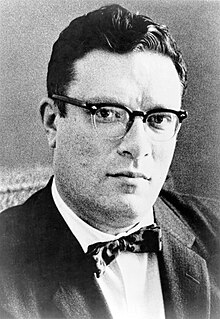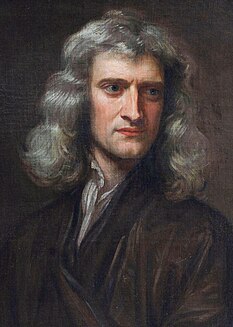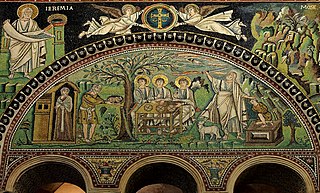
Isaac Asimov was an American writer and professor of biochemistry at Boston University. He was known for his works of science fiction and popular science. Asimov was a prolific writer who wrote or edited more than 500 books and an estimated 90,000 letters and postcards. His books have been published in 9 of the 10 major categories of the Dewey Decimal Classification.

Sir Isaac Newton was an English mathematician, physicist, astronomer, theologian, and author who is widely recognised as one of the most influential scientists of all time, and a key figure in the scientific revolution. His book Philosophiæ Naturalis Principia Mathematica, first published in 1687, laid the foundations of classical mechanics. Newton also made seminal contributions to optics, and shares credit with Gottfried Wilhelm Leibniz for developing the infinitesimal calculus.

Ontogeny is the origination and development of an organism, usually from the time of fertilization of the egg to the organism's mature form—although the term can be used to refer to the study of the entirety of an organism's lifespan.

The Caves of Steel is a science fiction novel by American writer Isaac Asimov. It is a detective story and illustrates an idea Asimov advocated, that science fiction can be applied to any literary genre, rather than just being a limited genre in itself.

The Binding of IsaacAqedat Yitzhaq, in Hebrew also simply "The Binding", הָעֲקֵידָה Ha-Aqedah, -Aqeidah) is a story from the Hebrew Bible found in Genesis 22. In the biblical narrative, God asks Abraham to sacrifice his son, Isaac, on Moriah. Abraham begins to comply, when a messenger from God interrupts him. Abraham then sees a ram and sacrifices it instead.

Alexios IV Angelos or Alexius IV Angelus was Byzantine Emperor from August 1203 to January 1204. He was the son of Emperor Isaac II Angelus and his first wife, an unknown Palaiologina, who became a nun with the name Irene. His paternal uncle was Emperor Alexius III Angelus.

Tokugawa Ieharu (徳川家治) was the tenth shōgun of the Tokugawa shogunate of Japan, who held office from 1760 to 1786.

Tenmei (天明) is a Japanese era name for the years between the An'ei Era and before the Kansei Era, from April 1781 through January 1789. The reigning emperor was Kōkaku Tennō' (光格天皇).

Eishō (永正) was a Japanese era name after Bunki and before Daiei. The period spanned the years from February 1504 through August 1521. The reigning emperor was Go-Kashiwabara-tennō (後柏原天皇).

Einin (永仁) was a Japanese era name after Shōō and before Shōan. This period spanned the years from August 1293 through April 1299. The reigning emperors were Fushimi-tennō (伏見天皇) and Go-Fushimi-tennō (後伏見天皇).

Vaisakhi, also known as Baisakhi, Vaishakhi, or Vasakhi is a historical and religious festival in Sikhism. It is usually celebrated on 13 or 14 April every year, which commemorates the formation of Khalsa panth of warriors under Guru Gobind Singh in 1699. It is additionally a spring harvest festival for the Sikhs.
Pope Isaac of Alexandria, 41st Pope of Alexandria and Patriarch of the See of St. Mark, was born in El-Borolos from rich, God-fearing parents. They begot him long after their marriage. When they took him for baptism, the bishop who baptized him saw a cross of light over his head. The bishop laid the boy's hand over his head and prophesied concerning him saying, "The church of God will be entrusted to him." Then he told his parents, "Take care of him, for he is a chosen vessel of God."

Enchō (延長) was a Japanese era name after Engi and before Jōhei. This period spanned the years from April 923 through April 931. The reigning emperors were Emperor Daigo-tennō (醍醐天皇) and Emperor Suzaku-tennō (朱雀天皇).

Chōtoku (長徳) was a Japanese era name after Eiso and before Chōhō. This period spanned the years from February 995 through January 999. The reigning emperor was Ichijō-tennō (一条天皇).

Shōō (正応) was a Japanese era name after Kōan and before Einin. This period spanned the years from April 1288 through August 1293. The reigning emperor was Fushimi-tennō (伏見天皇).

Tenji (天治) was a Japanese era name after Hōan and before Daiji. This period spanned the years from April 1124 through January 1126. The reigning emperor was Sutoku-tennō (崇徳天皇).

Chōji (長治) was a Japanese era name after Kōwa and before Kajō. This period spanned the years from February 1104 through April 1106. The reigning emperor was Emperor Horikawa-tennō (嘉保天皇).

Ontogenetic depth is a pseudoscientific idea proposed in February 2003 by Paul Nelson, an American philosopher of science, young Earth creationist and intelligent design advocate; he is employed by the Discovery Institute.
Andronikos Doukas Angelos was a Byzantine aristocrat related to the ruling Komnenos dynasty. During the reign of his cousin, Manuel I Komnenos, he served without success as a military commander against the Seljuk Turks, and as envoy to the Kingdom of Jerusalem. Following Manuel's death, in 1182 he was sent to stop the rebellion of Andronikos I Komnenos, but was defeated and eventually defected to him. Shortly after, he led a failed conspiracy of leading aristocrats against Andronikos I. When it was discovered, Andronikos and his sons fled the Empire, ending up in Acre, where he died. He was the father of emperors Isaac II Angelos and Alexios III Angelos.












